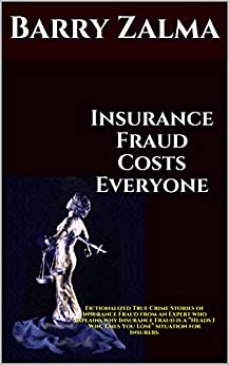Auto Insurance Fraud

This blog post is a fictionalized True Crime Story of Insurance Fraud from an Expert who explains why Insurance Fraud is a “Heads I Win, Tails You Lose” situation for Insurers. The story is posted to help to Understand How Insurance Fraud in America is Costing Everyone who Buys Insurance Thousands of Dollars Every year and Why Insurance Fraud is Safer and More Profitable for the Perpetrators than any Other Crime.
See the full video at https://rumble.com/v3qjjaf-insurance-fraud-and-the-auto.html and at https://youtu.be/CmUOiqJWg-A
THE AUTO FRAUD
To a person intent on perpetrating an insurance fraud two maxims become immediately clear:
Insurers don’t care.
most adjusters and investigators wouldn’t know a fraud if it presented itself to them wearing a sign saying: “I am a fraud.”
Very successful, multimillion-dollar businesses were set up with those maxims in mind.
The most successful is the automobile personal injury fraud. It exists in almost every metropolitan community. Each perpetrator of an automobile personal injury fraud varies the methodology slightly.
Rather than isolated instances of fraud they are run like a large corporate entity. The following are the categories of individuals involved in the automobile personal injury fraud ring:
This is a person who worked in the community to recruit two different types of people: the victims and the insureds. They recruit victims from the ranks of the unemployed, individuals on welfare or anyone in need of quick cash. The same sources provide insureds who may even include wealthy, or well-off people, who need cash to support their purchase of illicit drugs.
The recruiting techniques are simple and straightforward. A victim is offered $300 to $500 cash to allow his name to be used in a report of an automobile accident. Sometimes they must actually sit in a car that is then struck by one of the recruited insureds. Sometimes they only sell the use of their names.
In fact, depending on the insurer involved and the reputation it has for investigation of such claims, living persons are not necessary to play the role of victim. In such situations, the insured merely runs his vehicle into a stationary object such as a garage wall or telephone phone to create damage to his vehicle. He reports that he struck the victim’s vehicle in a private parking lot and that the victim and four of his passengers are reporting personal injuries. All of the victims hire counsel. Almost always the victims hire the same lawyer who refers them all to the same physician or chiropractor.
Depending on his experience, the lawyer either recruits the recruiter or is recruited by the recruiter. The recruiters usually watch the results of the bar examination and then make contact with a newly admitted lawyer. They advise the lawyer that, for a small share of the proceeds, they can provide him with ten to twenty new personal injury plaintiff cases every month. They claim that they have this source of business because they work as an administrator for a local chiropractic clinic or in a body shop.
The young, gullible lawyer, either not realizing that it is a crime to pay a person for a case, or is so hungry for work that he or she ignores the law, agrees. The young lawye
r never meets his or her client. He or she gets contingency fee agreements from the recruiter and medical reports reflecting the injuries. He then makes demand on the insurer who has already received a report from its insured (who was paid to do so) advising that the accident was the insured’s fault.
The lawyer makes demands on the insurer for settlement. After a few telephone calls and copies of the medical reports he settles with the insurer for between $5,000 and $10,000 a plaintiff. The lawyer keeps all of the money less the fees of the recruiter, the victim and the insured.
The lawyer makes an excellent living earning more money than he ever would on salary for any law firm. He learns the trade and recruits his own recruiters to keep more of the money.
Greed and the Dishonest Lawyer
The people involved in staged automobile accident claims are usually successful until they get greedy. In 2011, Robert Belshaw, 56, a Marina del Rey, California attorney was sentenced to seven years and eight months in prison for his role in an auto insurance fraud ring that stole about $3 million. Belshaw was found guilty in March of five counts of money laundering and three counts of state income tax evasion.
A co-defendant and ring leader, Solomon Morris Davis, 61, of Rancho Palos Verdes, also was convicted on 20 counts of insurance fraud and conspiracy. He was sentenced in April to 12 years in state prison. The ring staged accidents to defraud insurance companies.
Prosecutors told the press that Davis set up Total Medical Healthcare in the mid-Wilshire area of Los Angeles under the name of his wife, Dr. Jody Hunter-Davis, as part of the scam. She, however, did not practice medicine at the clinic and was not a suspect in the case. As part of the fraud scheme, the signatures of doctors who worked part-time at the clinic were forged for inflated billings.
Davis recruited Belshaw to run a sham law practice that negotiated the fraudulent billings with insurance companies from September 1999 to April 2003. Belshaw failed to claim any of his earning on state income tax returns from 1999 to 2001, officials with the state Franchise Tax Board said. Belshaw owes the tax board more than $31,600 in unpaid taxes, penalties, interest and the cost of the investigation.
 Had Mr. Belshaw limited the number and extent of fraudulent claims he would probably still be presenting fraudulent claim and earning a good living. Because he got greedy, because he failed to report the money he earned from his criminal activity, he is now residing in the grey bar hotel operated by the state of California and can only wear an orange jump suit.
Had Mr. Belshaw limited the number and extent of fraudulent claims he would probably still be presenting fraudulent claim and earning a good living. Because he got greedy, because he failed to report the money he earned from his criminal activity, he is now residing in the grey bar hotel operated by the state of California and can only wear an orange jump suit.
This post was adapted from my book, Insurance Fraud Costs Everyone Available as a Kindle Book and Available as a Paperback from Amazon.com.
(c) 202 3 Barry Zalma & ClaimSchool, Inc.
3 Barry Zalma & ClaimSchool, Inc.
Please tell your friends and colleagues about this blog and the videos and let them subscribe to the blog and the videos.
Subscribe to Excellence in Claims Handling at locals.com at https://zalmaoninsurance.locals.com/subscribe or at substack at https://barryzalma.substack.com/publish/post/107007808
Go to Newsbreak.com https://www.newsbreak.com/@c/1653419?s=01
Follow me on LinkedIn: www.linkedin.com/comm/mynetwork/discovery-see-all?usecase=PEOPLE_FOLLOWS&followMember=barry-zalma-esq-cfe-a6b5257
Daily articles are published at https://zalma.substack.com. Go to the podcast Zalma On Insurance at https://podcasters.spotify.com/pod/show/barry-zalma/support; Go to Barry Zalma videos at Rumble.com at https://rumble.com/c/c-262921; Go to Barry Zalma on YouTube- https://www.youtube.com/channel/UCysiZklEtxZsSF9DfC0Expg; Go to the Insurance Claims Library – http://zalma.com/blog/insurance-claims-l
Like this:
Loading…



